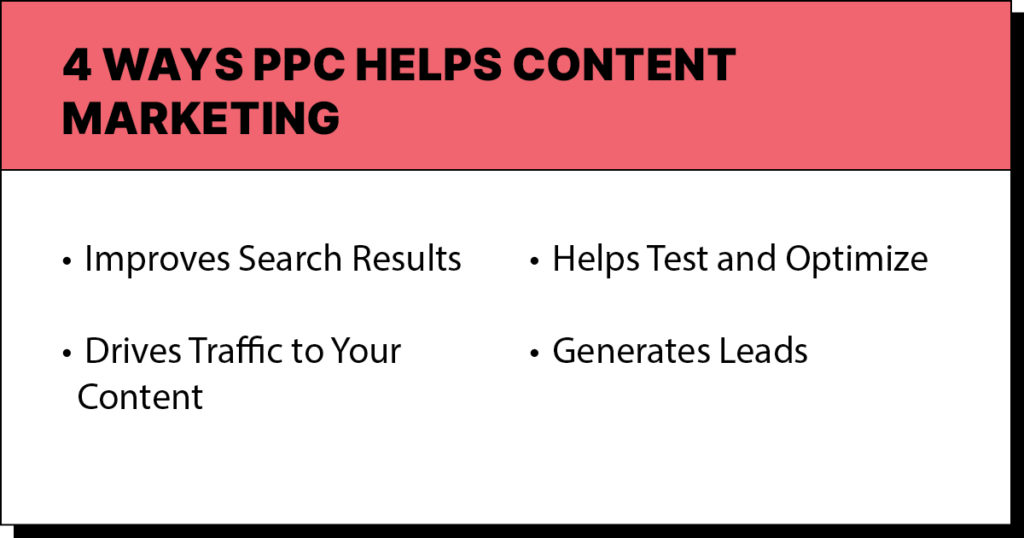You’ve probably noticed the endless list of marketing tactics, tools, channels and solutions at your disposal. But while unlimited options are nice, no one has an unlimited budget, especially if you rely on pay-per-click (PPC) advertising alongside organic means. It’s at this point that you might encounter that age-old debate of content marketing vs. PPC.
While both tactics aim to grow your business, they have different uses, and the results aren’t measured the same. Content marketing focuses on organically attracting an audience with thoughtful, valuable content. Meanwhile, PPC is a short-term solution that relies on paid advertising to drive traffic. Strong content helps encourage engagement, while paid campaigns drive higher conversion rates.
With so many options available, it can be tempting to try everything, but it’s important to be strategic and focus on what brings you the greatest return on your investment. That’s why it’s important to understand the role of content marketing and PPC in your marketing efforts.
While organic content marketing and PPC are proven methods, they each have strengths and weaknesses. Knowing when and how to use each can make all the difference for your campaigns. Let’s take a closer look at these two marketing methods and how they drive traffic, leads and sales to your business.
What Is Content Marketing?
Content marketing is a strategic marketing approach focused on creating and distributing valuable, relevant and consistent content to attract and retain a clearly defined audience — and, ultimately, to drive profitable customer action.
Content marketing is used in conjunction with other marketing strategies, such as search engine optimization (SEO), in order to generate more leads and convert more customers.
When done correctly, content marketing can be an extremely effective way to build brand awareness, drive traffic to a website, and generate leads and sales.
4 Benefits of Using Content Marketing
Content marketing is often more engaging than other forms of marketing. You can tell stories and connect with your audience on a deeper level. Content marketing can be interactive, empowering your audience to share their experiences and perspectives. This format builds trust and credibility while generating leads and sales.
Learn more about common benefits of content marketing.
Improved SEO
One of the main benefits of using content marketing is that it can help improve your SEO. When you create a high-quality, keyword-rich piece of content, you’re more likely to rank higher in search engine results pages (SERPs). In turn, this can lead to more website visitors and potential customers.
Increased Web Traffic
Another benefit of using content marketing is that it can help increase web traffic. People who find your content useful and relevant are more likely to share it with others. As a result, you can see a significant increase in web traffic over time.
More Leads and Sales
If done correctly, content marketing helps you get more leads and sales. When you provide valuable, relevant information to your target audience when they’re in the buying cycle, they’re more likely to be interested in your offerings, which leads to more conversions and sales.
Increased Brand Awareness
Content marketing increases brand awareness when audiences associate your quality, relevant content with your brand. This positive association pays off when they need the products or services you offer.
What Is PPC?
PPC is a form of online marketing in which advertisers pay a fee each time one of their ads is clicked. Essentially, it’s a way of buying visits to your site rather than attempting to “earn” those visits organically.
PPC is an effective way to drive traffic to your website, and it can be a particularly useful tool for businesses that are just starting out and trying to build up their web presence. It’s also a good option for businesses that have specific marketing goals in mind, such as generating leads or making sales.
The most common type of PPC advertising is search engine advertising. In fact, this type is so common that PPC is often referred to as “paid search.” This approach involves paid ads on search engines like Google and Bing. Pricing is based on an auction system where you bid on keywords related to your products or services.
When someone searches for a keyword relevant to your business, your ad appears in the results. The amount you pay depends on a number of factors, including your bid amount and the quality score of your ad, which is determined by the relevance and usefulness of your ad for the user.
While less common, you can use PPC to place ads on social media sites such as Facebook and Twitter. PPC can also take the form of display advertising, such as banner ads on websites and apps.
4 Benefits of Using PPC
PPC can be an extremely effective way to drive traffic to your website, especially if you’re just starting out or when you have specific marketing goals. A difference between PPC and content marketing is that with PPC, you can launch a campaign and begin seeing results almost immediately.
Here are some common benefits of using PPC.
You Only Pay When Someone Clicks on Your Ad
With PPC, you only pay when someone actually clicks on your ad. This means that you only spend money on potential customers who are interested in what you have to offer. This approach differs from other types of advertising that require an upfront, potentially fixed spend.
PPC Is Fast and Flexible
PPC is a quick way to generate traffic to your website. PPC campaigns are flexible, too, as you can adjust as conditions warrant. You can even pause your campaign if, for example, you need to make adjustments or cap spending.
PPC Lets You Target Specific Types of Customers
With PPC, you can target specific customers based on their location, interests and search history. This reduces wasted ad spend because, in most cases, the people most likely to be interested in your ads are the ones who see them.
PPC Helps You Get More Leads and Sales
By driving targeted traffic to your website, PPC is a powerful way to generate leads and sales. PPC is a great fit for campaigns with a specific goal, such as generating certain types of leads. And because you’re targeting the people most likely interested in your content, they’re more likely to be interested in your offerings when they look to make a purchasing decision.

How Does PPC Help Content Marketing?
Now that you know the value of PPC vs. content marketing, it’s up to you to determine what the best fit is for your organization. It can be difficult to choose between two trusted methods with proven results. But what if we told you that there was a way to make these two approaches work together, like a well-oiled machine?
Nowadays, an effective online marketing campaign requires a mix of content marketing and PPC. Here’s a look at how these two approaches complement each other.
Improves Search Results
One of the main benefits of content marketing is improving your organic search results. By creating high-quality content that’s optimized for SEO, you attract more visitors from search engines. And because organic traffic is free, this is a great way to save on your marketing costs.
But how does this help with your PPC campaigns? Well, if you’re able to improve your organic search results, you may be able to get by with a lower PPC budget. That’s because you’ll get more free traffic from Google and other search engines. Additionally, organic traffic tends to be more engaged than paid traffic, which means that they’re more likely to convert into leads or customers. So you’ll not only save money on your PPC campaigns but you’ll also be more likely to see a return on investment.
Drives Traffic to Your Content
PPC is a great way to drive traffic to your content, whether it’s a blog post, downloadable asset, video or other format. By using PPC, you increase the odds that your site visitors are actually interested in what you have to say. Combine your SEO with PPC to ensure that you target the high-value keywords and demographics that align with your content and services.
Helps Test and Optimize
PPC campaigns are a flexible and cost-effective way to test and optimize your content marketing strategy. By experimenting with different ad formats, headlines and messaging, you quickly determine what resonates with your target audience. Those insights inform how you create your ads and how you think about your content calendar.
Generates Leads
You can also use PPC advertising to promote content specifically designed to generate leads, such as white papers, webinars and other forms of gated content that require users to provide their contact information to access.
This approach helps you reach potential customers who actively search for information on a topic related to your business. While many of those visitors won’t be at the right stage in the buying cycle, you can nurture them with email marketing campaigns.
The Winning Solution
In the battle of content marketing vs. PPC, the real winners are those who understand the value of each method and use a combination of the two to drive engagement and conversions.
Content marketing helps you offer value and build trust, but meaningful content alone isn’t enough. PPC helps you find relevant audiences quickly, and it’s one of the most effective ways to use advertising to drive conversions.
While both options work well independently, they perform even better as part of a coordinated, comprehensive marketing strategy. Always remember that you don’t need to worry about content marketing vs. PPC. You want to drive growth with content marketing and PPC.






